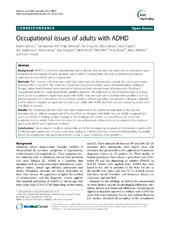| dc.contributor.author | Adamou, Marios | en_US |
| dc.contributor.author | Arif, Muhammad | en_US |
| dc.contributor.author | Asherson, Philip | en_US |
| dc.contributor.author | Aw, Tar-Ching | en_US |
| dc.contributor.author | Bolea, Blanca | en_US |
| dc.contributor.author | Coghill, David | en_US |
| dc.contributor.author | Guðjónsson, Gísli | en_US |
| dc.contributor.author | Halmøy, Anne | en_US |
| dc.contributor.author | Hodgkins, Paul | en_US |
| dc.contributor.author | Müller, Ulrich | en_US |
| dc.contributor.author | Pitts, Mark | en_US |
| dc.contributor.author | Trakoli, Anna | en_US |
| dc.contributor.author | Williams, Nerys | en_US |
| dc.contributor.author | Young, Susan | en_US |
| dc.date.accessioned | 2014-08-15T09:15:36Z | |
| dc.date.available | 2014-08-15T09:15:36Z | |
| dc.date.issued | 2013-02-17 | eng |
| dc.identifier.issn | 1471-244X | |
| dc.identifier.uri | https://hdl.handle.net/1956/8284 | |
| dc.description.abstract | Background: ADHD is a common neurodevelopmental disorder that persists into adulthood. Its symptoms cause impairments in a number of social domains, one of which is employment. We wish to produce a consensus statement on how ADHD affects employment. Methods: This consensus development conference statement was developed as a result of a joint international meeting held in July 2010. The consensus committee was international in scope (United Kingdom, mainland Europe, United Arab Emirates) and consisted of individuals from a broad range of backgrounds (Psychiatry, Occupational Medicine, Health Economists, Disability Advisors). The objectives of the conference were to discuss some of the occupational impairments adults with ADHD may face and how to address these problems from an inclusive perspective. Furthermore the conference looked at influencing policy and decision making at a political level to address impaired occupational functioning in adults with ADHD and fears around employing people with disabilities in general. Results: The consensus was that there were clear weaknesses in the current arrangements in the UK and internationally to address occupational difficulties. More so, Occupational Health was not wholly integrated and used as a means of making positive changes to the workplace, but rather as a superfluous last resort that employers tried to avoid. Furthermore the lack of cross professional collaboration on occupational functioning in adults with ADHD was a significant problem. Conclusions: Future research needs to concentrate on further investigating occupational functioning in adults with ADHD and pilot exploratory initiatives and tools, leading to a better and more informed understanding of possible barriers to employment and potential schemes to put in place to address these problems. | en_US |
| dc.language.iso | eng | eng |
| dc.publisher | BioMed Central | eng |
| dc.rights | Attribution CC BY | eng |
| dc.rights.uri | http://creativecommons.org/licenses/by/2.0 | eng |
| dc.title | Occupational issues of adults with ADHD | en_US |
| dc.type | Peer reviewed | |
| dc.type | Journal article | |
| dc.date.updated | 2013-08-23T08:54:12Z | |
| dc.description.version | publishedVersion | en_US |
| dc.rights.holder | Copyright 2013 Adamou et al.; licensee BioMed Central Ltd. | |
| dc.rights.holder | Marios Adamou et al.; licensee BioMed Central Ltd. | |
| dc.source.articlenumber | 59 | |
| dc.identifier.doi | https://doi.org/10.1186/1471-244x-13-59 | |
| dc.identifier.cristin | 1032009 | |
| dc.source.journal | BMC Psychiatry | |
| dc.source.40 | 13 | |

